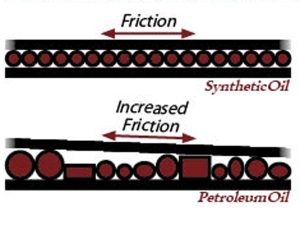Brake-O-Rama understands that customers may want to space out their car maintenance a little longer during this recession. However routine maintenance is necessary to avoid long term damage to the engine. If you are considering an oil change, car owners who want the very best for their vehicles commonly turn to synthetic motor oil, although this choice sometimes comes at the objection of natural oil enthusiasts who see no benefit to synthetic lubricants. While synthetic oil is somewhat more expensive than natural oil, and some debates about its benefits persist, synthetic oil holds a number of advantages over its natural counterpart. At Brake-O-Rama we use both oils and use synthetic oil as requested.
About Synthetic and Natural Oils
Natural automotive oils are composed of many of the same elements found in other petroleum products, and are rooted in the same crude oil pumped by oil companies from around the globe. Because natural oils are naturally occurring, there is minimal control over the inclusion of additional elements (namely sulfur) in the oil composition. Synthetic oils, however, are developed in laboratories to have precise strains of desirable chemicals, and the manufacture of the lubricants takes place in tightly controlled plants operated by major oil corporations. While natural oils possess a naturally occurring ability to lubricate surfaces, synthetic oils are specifically designed to carry out this purpose.
Low Temperature Performance
 Natural oils contain a number of impurities, specifically sulfur and hydrocarbons. When an engine is first started, these impurities can inhibit the flow of oil through the engine, delaying the ability of the oil to properly lubricate moving engine components. Because synthetic oil is specifically designed to work under both low and high temperature conditions, it lacks the inhibitors that slow oil distribution; the performance-oriented synthetic oil can be quickly distributed throughout an engine almost immediately after the engine is started. According to automotive experts at Car Craft Magazine, the 0W-30 weight synthetic oil, manufactured specifically for cold conditions, flows approximately seven times faster than natural oil when an engine is first started.
Natural oils contain a number of impurities, specifically sulfur and hydrocarbons. When an engine is first started, these impurities can inhibit the flow of oil through the engine, delaying the ability of the oil to properly lubricate moving engine components. Because synthetic oil is specifically designed to work under both low and high temperature conditions, it lacks the inhibitors that slow oil distribution; the performance-oriented synthetic oil can be quickly distributed throughout an engine almost immediately after the engine is started. According to automotive experts at Car Craft Magazine, the 0W-30 weight synthetic oil, manufactured specifically for cold conditions, flows approximately seven times faster than natural oil when an engine is first started.
High Temperature Performance
 Engine temperatures can reach extreme highs under normal operating conditions, and a number of factors–including traffic jams, extended stop-and-go conditions, and even long drive-through lines—can push temperatures even higher. According to scientists at Mobil, natural oil is composed of an “inconsistent mixture of long and short chains of carbon and hydrogen atoms.” This inconsistency allows natural oils to break down quickly, losing a portion of their viscosity at high operating temperatures. In contrast, the specially designed synthetic oils are engineered to withstand the highest operating temperatures of an engine, providing maximum lubrication under a wide spectrum of operating conditions.
Engine temperatures can reach extreme highs under normal operating conditions, and a number of factors–including traffic jams, extended stop-and-go conditions, and even long drive-through lines—can push temperatures even higher. According to scientists at Mobil, natural oil is composed of an “inconsistent mixture of long and short chains of carbon and hydrogen atoms.” This inconsistency allows natural oils to break down quickly, losing a portion of their viscosity at high operating temperatures. In contrast, the specially designed synthetic oils are engineered to withstand the highest operating temperatures of an engine, providing maximum lubrication under a wide spectrum of operating conditions.
High Mileage Engines
Conventional, natural motor oils contain a number of contaminants, and these substances can contribute to build-up in a vehicle’s engine. Over time, small deposits of sulfur, hydrocarbons, and even wax can accumulate on the moving components of an engine and inhibit its operation, a condition sometimes advertised as “robbing a car of its horsepower.” Synthetic oils are engineered not to build up on engine components, and some are designed to clean engines as they lubricate. For this reason, many automotive experts recommend synthetic motor oils for vehicles with more than 100,000 miles.
Price
Because natural oils are derived from naturally occurring crude, they can generally be refined and marketed at a lower cost than their synthetic counterparts. Synthetic motor oils can cost as much as twice the price of their conventional equivalents, with some specialty formulas priced at up to four times the cost of a similar weight conventional oil. A quart of synthetic motor oil can cost about $9.00 yielding an approximate cost of $45.00 for a five-quart oil change. In contrast, a generic store-brand conventional oil cost $2.79 per quart, totaling $13.95 for a typical oil change. Some of this cost difference can be recovered, however, in the longer intervals between changes allowed when using a synthetic oil, as automotive experts recommend changing conventional oils every 2,500 miles while synthetic oils can last 5,000, 10,000, or even (in extreme cases) 25,000 miles.
via http://brakeorama.info/brake-o-rama-discusses-synthetic-vs-regular-oil-change/
http://brake-o-rama.com/
